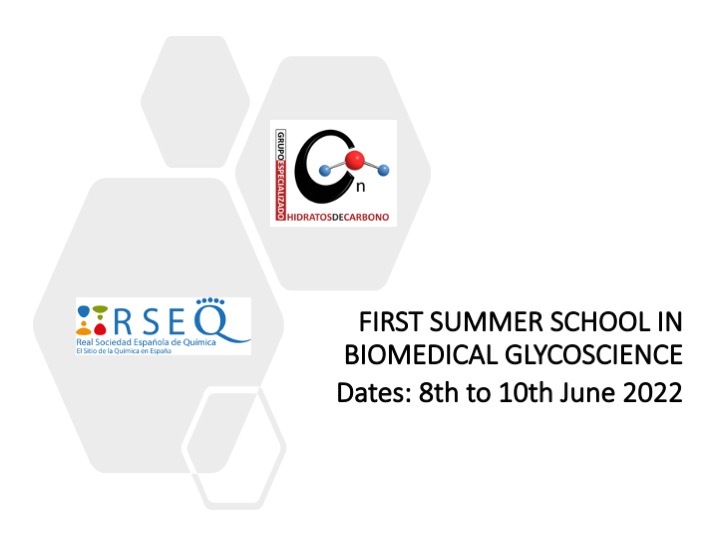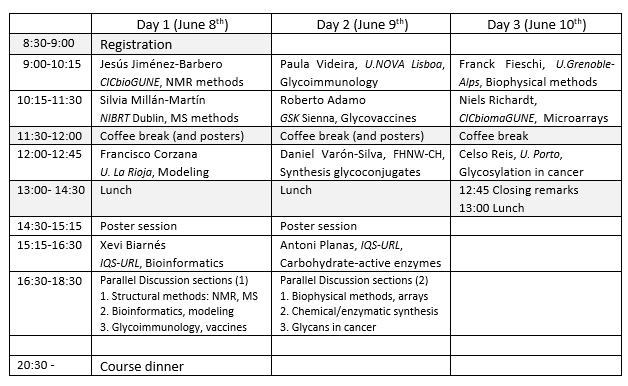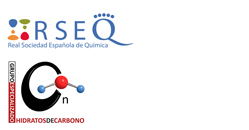First Summer School in Biomedical Glycoscience
Dates: June 8th-10th, 2022
Place: Residencia Universitaria de Jaca, Huesca, Spain
Organized by the Carbohydrates Group of the Spanish Royal Society of Chemistry

The Carbohydrates Group (GE HiC) of the Spanish Royal Society of Chemistry is pleased to announce the organization of the FIRST SUMMER SCHOOL IN BIOMEDICAL GLYCOSCIENCE. The objective is to establish an annual/biannual summer school addressed to doctoral students, recent postdocs and, in general, researchers interested in the subject. The course is composed of classes taught by expert researchers/teachers in each monographic topic, poster presentations by students and discussion sessions in small groups.
The first edition of the Summer School will take place in the Residencia Universitaria de Jaca (Spain) on June 8th to 10th, 2022. The venue has excellent facilities, which includes accommodation, conference rooms, and lunch room, well suited to have an intense course and networking settings for all participants during this 3-day course.
The program is organized in four thematic sessions with invited lecturers plus one session on “soft skills”. Lectures in each session are intended to provide the background on the concepts, applications and recent advances in the different topics, both to give general training to students and to inspire them on possible applications to their own projects. The program will also include a “poster session” and will be complemented with parallel «discussions sessions» by thematic areas in small groups and with the participation of a lecturer to lead the discussions around questions and problems raised by the students related to their projects.
PRELIMINARY PROGRAM
Preliminary program (updated)
Session 1.- Analytical tools for the characterization of glycans and protein-carbohydrate interactions
Jesús Jiménez-Barbero, CICbioGune, Bilbao
NMR methods to analyze glycan structures and carbohydrate-protein interactions
Silvia Millán-Martín, National Institute for Bioprocessing Research & Training, Dublin
Mass spectrometry as enabling technology in glycomics. Methods and applications
Franck Fieschi, Institut de Biologie Structurale, Université Grenoble Alpes, Grenoble, France
Biophysical methods for studying carbohydrate-protein interactions: a case study of receptors involved in host-pathogen interactions.
Niels Reichardt, CIC biomaGUNE, San Sebastián
Microarrays for Functional Glycomics
Session 2.- Design and synthesis of glycans and multivalent glycan systems
Daniel Varón Silva, School of Life Sciences, University of Applied Sciences and Arts Northwestern Switzerland
Synthesis of Glycoconjugates for Biomedical Applications
Antoni Planas, Institut Químic de Sarrià, University Ramon Llull, Barcelona
Carbohydrate active enzymes and their applications to chemoenzymatic synthesis of glycans and glycoconjugates
Session 3.- Glycobioinformatics and modelling of protein-carbohydrate complexes
Xevi Biarnés, Institut Químic de Sarrià, University Ramon Llull, Barcelona
Bioinformatic tools in CAZy discovery, analysis and evolution
Francisco Corzana, Universidad de La Rioja
Modeling of biological systems by molecular dynamics (MD) simulations
Session 4.- Role of glycans in oncology and immunology
Celso Reis, Institute for Research and Innovation in Health – University of Porto
Glycosylation in cancer progression and metastasis. From biomarkers to therapeutics.
Paula Videira, Faculdade de Ciências e Tecnologia, Universidade NOVA de Lisboa, Caparica, Portugal; CD&Allies-PPAIN Professionals and Patients Association Network
Glycoimmunology: sugars on the fuss for improved immunotherapies?
Roberto Adamo, GSK, Sienna, Italy
Elucidating glycan epitopes to guide vaccine design
b) POSTER SESSIONS
All participants are welcomed to present a poster communication related to their research projects. There will be two poster session for discussions in front of the posters. Posters will be exhibited during all the course.
An abstract for the poster communication should be submitted upon pre-registration
c) DISCUSSION SESSIONS
Discussion sessions in small groups of 10-15 participants with one lecturer advisor, organized in 3 parallel sessions on day 1 and day 2.
Upon pre-registration, each student selects his/her priorities for participation in each discussion session. Based on the requests, the Organization will assign (in advance) each student to the corresponding discussion sessions.
Likewise, upon pre-registration, participants are entitled to provide few questions or problems related to their own research to be addressed during the discussion sessions.
The discussion sessions, chair/moderated by one lecturer, will be a forum for debate addressing the questions raised by the participants, such as technical problems of their research for advice, searching for new approaches and, eventually, establishing collaborations.
| Parallel Discussion sessions (day 1) | |
| 1A | NMR and MS tools for the characterization of glycans structure and interactions |
| 1B | Design and synthesis of glycans. Chemical and enzymatic synthesis |
| 1C | Glycoimmunology and conjugated vaccines |
| Parallel Discussion sessions (day 2) | |
| 2A | Biophysical methods and microarrays in protein-carbohydrate interactions |
| 2B | Bioinformatics and molecular modeling in glycobiology |
| 2C | Role of glycans in oncology |
PROGRAM

IMPORTANT DATES
- Pre-registration opening: April 1st, 2022
- Pre-registration deadline: May 1st, 2022
- Notification of acceptance deadline: May 13th, 2022
- Registration and payment deadline: May 25th, 2022
- On-site Course: June 8th–10th, 2022 (arrival on June 7th (afternoon/evening)
The GEHiC Summer School course registration fees are broken down in two different concepts:
- REGISTRATION FEE*. It includes participation and course materials, coffee breaks, working lunches and Course dinner on June 9th.
200€ for members of the GE HiC – RSEQ anf of the Grupo de Glúcidos – Sociedade Portuguesa de Química.
280€ for non-members**
The registration fee will be paid to the GEHiC.
- ACCOMMODATION FEE. It includes 3 nights (arrival on June 7th afternoon, departure on June 10th) at the Residencia Universitaria de Jaca, the venue of the Summer Course.
100 € for three nights including breakfast.
The accommodation fee will be paid to the Residencia Universitaria de Jaca.
* The course is sponsored by the Carbohydrates Group (GE HiC) and other entities. All participants will benefit of a low registration fee and no individual fellowships will be offered.
**Non-members of the RSEQ and of the GE HiC are welcomed to become members prior to registration to benefit from the services of the Carbohydrates Group and the Spanish Royal Society of Chemistry. To become a member, visit https://rseq.org/inscripcion/ and include the enrolment to the “Grupo Especializado de Hidratos de Carbono“ in the registration form. Portuguese participants non-members of Grupo de Glúcidos – Sociedade Portuguesa de Química are also welcomed to become members prior to registration. To become member, visit https://www.spq.pt/associates/enroll
1.- PRE-REGISTRATION
Pre-registration: opens April 1st, 2022
Pre-registration deadline: May 1st, 2022
INSTRUCTIONS to complete the application form
- Personal data Including GE HiC member number, and name of the research group
- Attach the abstract of your poster presentation
- Select the discussions sessions (day 1 and day 2) you would like to participate. Prioritize from 1 (preferred) to 4 (less preferred) session:
Parallel sessions day 1
1.A. -NMR and MS tools for the characterization of glycans structure and interactions
1.B.- Design and synthesis of glycans. Chemical and enzymatic synthesis
1.C.- Glycobioinformatics. Bioinformatic tools and CAZyme discovery
1.D.-Role of glycans in oncology
Parallel sessions day 2
2.A.- Biophysical methods and microarrays in protein-carbohydrate interactions
2.B.- Design and synthesis of glycans. Multivalent systems
2.C.- Modeling tools of biological systems: docking and molecular dynamics
2.D.- Glycoimmunology and conjugated vaccines
- (optional) Propose questions related to your research that you would like to discuss during the sessions.
2.- ACCEPTANCE BY THE ORGANIZING COMMITTEE
Due to space constraints, the attendance is limited to 50 participants. The Organizing Committee will select and accept the applicants based on a “first-come, first-served” basis. Significant Research Groups representation biases will be avoided and a fair gender balance will be considered. Accepted participants will be notified and assigned to “discussion sessions” according to the applicant’s preferences in the pre-registration form and seats availability.
Notification of acceptance deadline (by the Organizing Committee): May 13th, 2022
3.- FINAL REGISTRATION AND PAYMENT
Fill in the forms included in the notification of acceptance and return them by e-mail to finalize the registration.
The notification of acceptance sent by e-mail will include:
a) Registration form with invoicing and payment information to be completed and sent to the Organizing Committee
b) Accommodation booking form and payment information to be sent to the Residencia Universitaria de Jaca .
Final registration and accommodation booking deadline: May 25th, 2022
School venue and accommodation of all participants and lecturers:
Residencia Universitaria de Jaca (https://resijaca.unizar.es/).
C/ Universidad, 3
22700 Jaca (Huesca)
resijaca@unizar.es
(+34) 974 360 196
By car: Jaca-Huesca-Zaragoza (N-330); Jaca-Pamplona (N-240)
By bus: regular bus: www.alosa.es
By train: www.renfe.es
